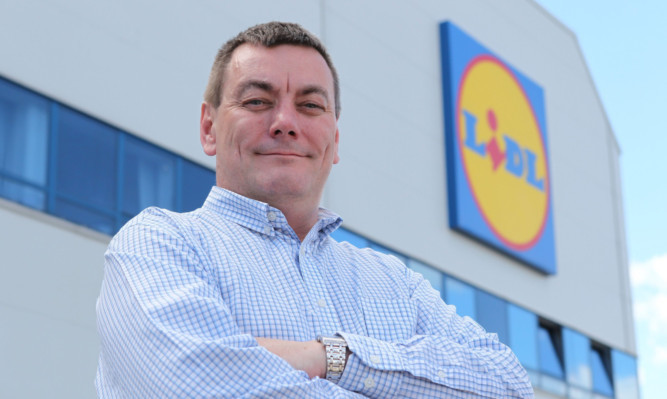
Now there are even BMWs in the car park.
It’s not long into my visit to Lidl’s massive distribution centre and already I’m in the dark. Literally.
Every few seconds the lights automatically switch off.
“It’s just one example of how we try not to waste a single penny so we can keep costs down,” says warehouse boss Euan Fitzpatrick. “And it’s not only the warehouse, but every part of all Lidl’s bases.”
It’s a little disconcerting. But how else do they save those all-important pennies?
Well, with the sort of Teutonic efficiency you’d expect from a German-founded outfit.
Every store with the exception of Kirkwall, which has the Sabbath off gets a delivery every single day. Each is allocated one or two numbered lanes (depending on the store size) in Lidl’s 290,000 sq ft distribution centre in Livingston, which supplies the entire Scottish operation.
The stores can order up to 33 pallets daily if they don’t take their full allocation, they’ll be given extra of whatever’s expected to be a good seller that day. Not a lorry leaves the distribution centre with an inch of spare space. And wherever possible they set off at night to take advantage of quieter roads and thus more cost-effective journeys.
The lorries are even loaded to match precisely the way that the stores are laid out, knocking hours off the unloading process.
“I’ve worked at other supermarkets and staff spend half their day at the back door taking one delivery after another,” explained Ross Millar, managing director of Lidl Scotland.
“If we don’t have people doing that, they can be in store dealing with customers.”
That strip-it-back-so-we-can-sell-it-cheap approach extends to staffing levels, too. Stores can have, at tops, 10, or as few as three, staff dealing with everything.
And absolutely nothing goes to waste. When the lorries come back they do so with every scrap of rubbish from the store to go into the plant’s own recycling centre. It’s then sold on to maximise profits.
But what really matters to the public is the quality as well as the price.
Although they won’t tell you up front, the suspicion we might actually be getting a very good deal on some tasty grub is correct. That bargain steak is just the same as you’ll find in M&S, although it will cost you twice as much at the Markie’s checkout. Lidl fruit and veg is also delivered from many of the same suppliers and is, they insist, every bit as fresh. There’s just less choice as the company won’t use air freight to transport a bean, berry or anything else.
If the produce can’t be grown in the UK or get here via lorry and boat, it won’t find its way to the shelves.
So, no pricey year-round fruit and veg from halfway round the world. And just a fraction of the 25,000 to 50,000 different lines in the giant supermarkets.
“We’ve got 1,800 lines,” says Ross. “You won’t find eight different varieties of tomato ketchup in six sizes. You’ll get our own label variety and Heinz in one size and ours has more tomatoes and won out in a BBC taste test.”
Lidl has been pushing hard with its Surprises TV campaign over the past two months. And although the chain is relatively small here with 88 stores in Scotland and 580 UK-wide it’s part of a growing global concern.
Lidl is part of Germany’s Schwarz Group, one of the top five food retailers in the world, giving America’s Walmart and France’s Carrefour a run for their money.
Almost a third of a million people work for Schwarz worldwide and 2012 sales topped £57 billion. UK turnover for the last year was £202 million, up almost 40% in the five years since the recession hit.
It has 10,000 stores and Livingston is just one of 100 distribution centres in Europe. “That means our buyers in Italy, for example, get great prices on the best Parma ham because they buy in huge quantities,” says Ross.
“But we do the same with Scottish produce that then goes all over. We export £100 million of whisky a year.”
A wander through the massive complex finds piles of Spanish olives and almonds for themed weeks. Bargain-buy food processors are stacked in their thousands ready for dispatch.
And Lidl have just announced plans to spend £30 million, creating 500 new jobs in an expansion north of the border.
“We’ll reach 100 stores by 2016,” said Ross. “And yes, we’re definitely seeing people shopping with us who wouldn’t have done before. There are a lot of nice cars in our car parks.
“People come and try us for bargains and they like the quality.
“More and more realise they can now do a proper full week’s shop and save a lot.
“I go round every store regularly, talking to staff and customers and they’re right behind what we’re doing.”

Enjoy the convenience of having The Sunday Post delivered as a digital ePaper straight to your smartphone, tablet or computer.
Subscribe for only £5.49 a month and enjoy all the benefits of the printed paper as a digital replica.
Subscribe